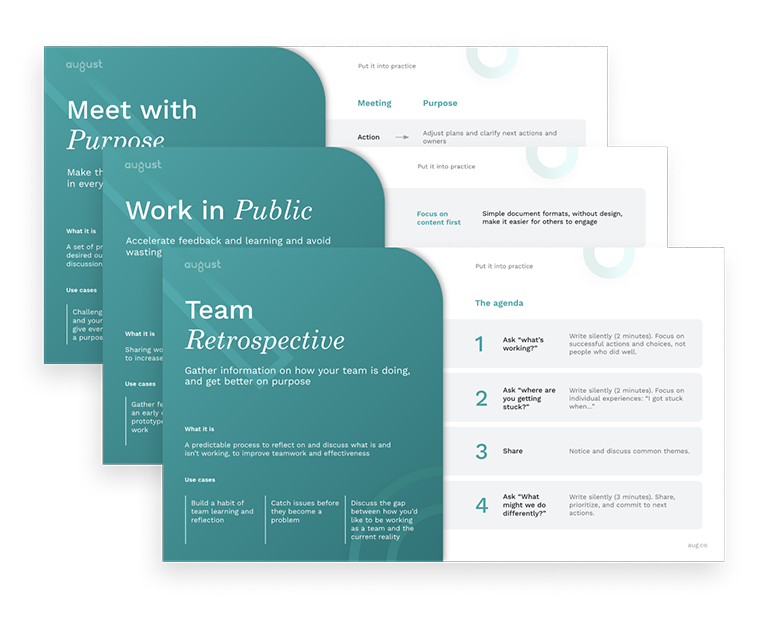Published May 4, 2023 | Updated May 4, 2023 | 4 minute read
Decision making is foundational to every aspect of your business - yet it’s so ubiquitous we rarely talk about it.
That is to say, we rarely talk about the actual moment when a decision gets made. We talk plenty about what happens before and after – and we have plenty of acronyms to delegate who gets power, responsibility, credit or blame. (RACI, anyone?)
But the actual moment when a decision gets made carries massive implications for your business outcomes and your company culture.
The decision-making moment lives at the intersection of leadership and culture. It’s where we choose whether to distribute or hold power; whether to include or exclude diverse perspectives; whether to learn something new or stay stuck where we are.
Empowerment, growth, efficiency and equity live or die in the moments when we make decisions together.
This is why it’s so important to train your leaders to be decision-making experts.
Skills like defining the decision, delegating decision ownership, choosing the most appropriate decision-making method, and recognizing the difference between data-based objections and personal preferences, are instrumental to your organization’s agility, resilience, and long-term success.
By focusing your leadership development efforts on these skills, you’ll speed up decision making throughout your organization, improve decision outcomes, and create meaningful inclusion – even when people disagree.
Teach leaders how to accelerate the decision-making process.
There’s a huge difference between “just talking” and “making a decision.” Yet most leaders don’t fully understand the importance of this distinction. The lack of clarity costs countless hours of meetings, and can delay a decision by weeks, months, or even years.
A decision-making moment should contain an explicit commitment to a specific course of action. It’s a clear, binary choice that should be understood by the entire team. If a leader asks each team member, “Did you make a decision? What did you decide?” they should all be able to give the same answer.
Skilled leaders know how to recognize and name a decision-making moment. They’ll ask, “Are we making a decision right now? Exactly what decision are we making today?” By bringing clarity to ambiguity, they save hours of wasted time and illuminate the most efficient path forward.
Skilled decision leaders create improved outcomes.
A leader who is trained in healthy decision making knows that the outcome of a single decision is not nearly as valuable as the information it yields. Every decision becomes a method for testing and refining a larger solution, and “failure” becomes incredibly valuable for its guidance towards future success.
This mindset frees leaders to make efficient, imperfect decisions, so long as they won’t cause harm. They learn to prioritize flawed - but, useful - action over perfect theory, and to accurately assess which decisions are “safe to try.”
This practice of iteration and revision leads to better business outcomes on a faster timeline than trying to make a single perfect decision from the start.
Intentional decision making drives inclusion.
Decision making offers a powerful way to fold DEI into your everyday practices. By training leaders in decision making, you’ll normalize a productive method for voicing dissenting viewpoints without impeding progress.
This is more crucial now than ever, as diverse leaders and high-potential employees increasingly expect to work in diverse, equitable and inclusive workplaces.
Without training, leaders will usually default to either a Consensus model or an Individual Action model of decision making. Both of these methods create major dysfunction, either slowing the decision to the point of impasse, or consolidating power with an individual who already carries great structural privilege.
But leaders who are trained in a full spectrum of decision-making methods will have alternate ways of moving the decision forward. These methods will empower participants to share constructive and relevant feedback, and give decision owners the tools to efficiently consider and incorporate that feedback into the decision-making process.
Best of all, the transparency of the process will invite confidence and participation from diverse participants. Stakeholders won’t feel a need to self-silence for the greater good, and decision owners will be empowered to move forward even without full agreement.
By investing in decision making as a core element of your leadership development program, your entire organization will feel the benefits of a more inclusive culture. As Alexis Gonzales-Black and I wrote about in our recent whitepaper, decision making can be a powerful lever for cultural change.
Skilled decision makers create immense value for your company.
Decision making is one of the best investments you can make in your leadership development programming. It will pay big dividends throughout your organization in terms of agility, innovation, retention and culture.
If you’d like to learn more, please reach out! I’d love to talk with you about how August can train your leaders to be decision-making experts.


.jpg)






